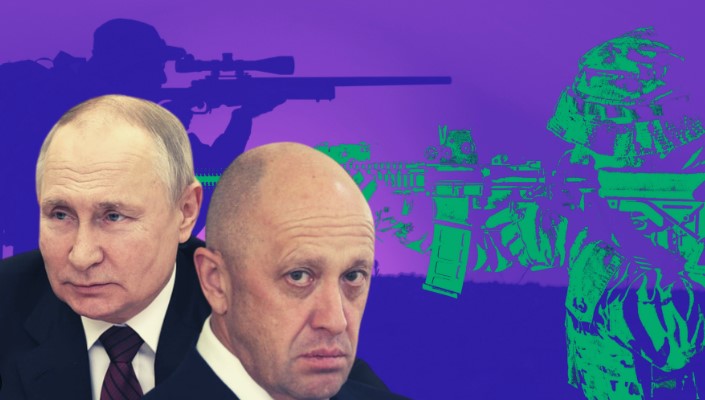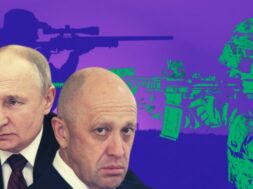
Roving Periscope: The Wagner Group’s mutiny jeopardizes Ukraine war, Putin’s position
Virendra Pandit
New Delhi: The coup failed but the ‘victor’ is weaker than ever.
The short-lived insurrection by the Wagner Group on Saturday last week has jeopardized not only Russian plans to win the prolonged Ukraine war in the foreseeable future but also made President Vladimir Putin’s political position vulnerable for the first time in three decades, the media reported on Tuesday.
Not only the West, which is supporting Ukraine but also a ‘pro-Russia’ China, is closely observing the unfolding scenario as President Putin’s own political position becomes increasingly vulnerable by the day.
Despite a Belarus-brokered deal, the Wagner militia is defiant.
In an 11-minute audio statement released on Monday from an unidentified place, Yevgeny Prigozhin, former Putin chef and head of the militia, said he acted “to prevent the destruction of the Wagner private military company” and in response to an attack on a Wagner camp that killed some 30 fighters.
In a boastful statement, the Wagner chief defended his short-lived mutiny but uncertainty still swirled about his own fate, as also that of senior Russian military leaders, its impact on the war in Ukraine, and even the political future of President Putin.
in a video aimed at projecting a sense of order after the country’s most serious political crisis created by Prigozhin in decades, Russian Defense Minister Sergei Shoigu made his first public appearance since the Saturday uprising that demanded his ouster.
“We started our march because of an injustice,” Prigozhin said in a recording that gave no details about where he is or his future plans.
A running feud between the Wagner chief and Russia’s top military brass, which has festered since the Russian invasion of Ukraine on February 24, 2022, erupted into a mutiny that saw the mercenaries leave Ukraine to seize a military headquarters in a southern Russian city, Rostov-on-Don, and roll seemingly unopposed for hundreds of miles toward Moscow, before suddenly turning around—al this within hours on Saturday.
The Kremlin claimed it had made a deal for Prigozhin to shift to Belarus and receive amnesty, along with his militia. But there has been no confirmation since Saturday last of his whereabouts. A Russian news channel reported that Prigozhin was spotted at a hotel in Minsk, the Belarusian capital.
In his boastful statement, he taunted Russia’s military, calling his march to Moscow a “master class” on how his private army, not the government military, should have carried out the February 2022 invasion of Ukraine. He also mocked the Russian Army for failing to protect the homeland, pointing out security breaches that allowed Wagner to march 780 km (500 miles) without facing resistance and block all military units on its way to the Russian capital last weekend.
His bullish statement made it no clearer what would ultimately happen to Prigozhin and his forces under the deal purportedly brokered by Belarusian President Alexander Lukashenko, a Putin acolyte.
Prigozhin didn’t disclose details, but said Lukashenko “proposed finding solutions for the Wagner private military company to continue its work in a lawful jurisdiction.” That suggested Prigozhin might keep his military force, although it wasn’t immediately clear which jurisdiction he was referring to.
Although the Wagner mutiny was brief, it did not remain bloodless. Russian media reported that several military helicopters and a communications aircraft were shot down by Wagner forces, killing at least 15 people. Prigozhin regretted the downing of the aircraft but said they were bombing his convoys.
Russia’s Defence Ministry has denied attacking Wagner’s camp, while the US had intelligence that Prigozhin was building up his forces near the border with Russia for some time, suggesting the revolt was pre-planned.
Russian media reported, amid some lawmakers calling for his head, a criminal case against Prigozhin hasn’t been closed, despite earlier Kremlin statements. It indicates Putin may strike back at his friend-turned-foe soon.
Russian media reported that Wagner offices in several Russian cities had reopened on Monday and the company had resumed enlisting recruits, but many thought it was peace before a storm.
In a show of normality, Moscow announced an end to the “counterterrorism regime” imposed on the capital on Saturday, when troops and armored vehicles set up checkpoints on the outskirts and authorities tore up roads leading into the city.
After Russian media speculated that Defense Minister Shoigu and the top military chief have lost Putin’s confidence and could be replaced, the Defence Ministry released a video of its Minister in a helicopter and his meeting with officers at a military headquarters in Ukraine.
Before the uprising, Prigozhin had blasted Shoigu and General Staff Chief General Valery Gerasimov with expletive-ridden insults for months, attacking them for failing to provide his troops with enough ammunition during the fight for the Ukrainian town of Bakhmut, the war’s longest and bloodiest battle.
Prigozhin’s revolt is being viewed as a desperate move to save Wagner from being dismantled in the wake of an order that all private military companies sign contracts with the Defence Ministry by July 1.
The Wagner leader said the majority of his fighters refused to come under the Defence Ministry’s command, and the force planned to hand over the military equipment it was using in Ukraine on June 30, after pulling out of Ukraine and gathering in the southern Russian city of Rostov-on-Don. Prigozhin claimed an attack that killed his fighters outraged the commanders and they decided to move sooner.
Western officials say Russia’s troops suffer low morale because of the long-stretching war that denies them victory and has caused the death of thousands of Russian soldiers. To boost their morale, Putin had used his own outfit, the Wagner, in the Ukraine war. The militia provided the only victory to Russia in months in Bakhmut.
The British Defense Ministry said on Monday that Ukraine had “gained impetus” in its push around Bakhmut, making progress around the town. Ukrainian forces claimed to have retaken Rivnopil, a village in an area of southeast Ukraine that has seen heavy fighting.
US President Joe Biden and leaders of Ukraine’s European allies discussed events in Russia over the weekend, but Western officials have not made many comments in public.
Russian Foreign Minister Sergey Lavrov told broadcaster RT that US Ambassador Lynne Tracy contacted Russian representatives on Saturday to stress that the US was not involved in the mutiny and considered it an internal Russian matter.
There was no immediate confirmation from the US, although Secretary of State Antony Blinken said on Sunday that US officials had “engaged” with Russia to stress the importance of protecting US citizens and interests.
NATO Secretary-General Jens Stoltenberg said on Monday that “the events over the weekend are an internal Russian matter.” EU foreign policy chief Josep Borrell said the revolt showed that the war is “cracking Russia’s political system”.
“The monster that Putin created with Wagner, is biting him now,” Borrell said. “The monster is acting against his creator.”














